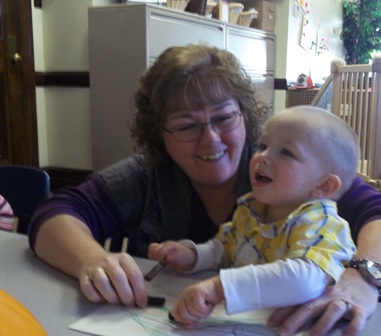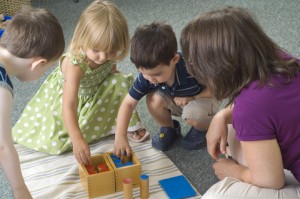 Family-Centered Early Supports and Services (FCESS), New Hampshire’s Early Intervention system, is a service provided to families and children under the age of three who have a developmental delay, disability or an established condition. Services are provided in the home and community to assist families in providing the best evidence based practices to increase a child’s growth and development.
Family-Centered Early Supports and Services (FCESS), New Hampshire’s Early Intervention system, is a service provided to families and children under the age of three who have a developmental delay, disability or an established condition. Services are provided in the home and community to assist families in providing the best evidence based practices to increase a child’s growth and development.
A home visitor will provide information, modeling and education, targeting specific goals to increase a child’s skills and functioning. Home visitors will also assist with service coordination to help families find resources and coordinate services with the family.
For more information or if you have concerns about your child’s development, please contact the Family Resource Center intake coordinator at (603) 581-1578. You may also use this Referral Form .
Getting Started
Referral and Intake
Anyone can make a referral to Early Supports and Services if they have concerns about a child’s development. We do strongly suggest making sure parents are aware you are making the referral as we are required to notify them. Call the Family Resource Center intake coordinator at (603) 581-1578 to make a referral. You may also use this Referral Form which can be brought in, mailed (P O Box 509 Laconia NH 03247) , faxed (603-524-0702) or emailed to tylaine.guarriello@lrcs.org. The intake coordinator will contact you for an intake within ten days . She will inquire about your concerns, family needs, background information and complete the necessary paperwork. If there are still concerns for your child or you would like a development assessment, one will be scheduled within 45 days to assess each area.
Eligibility and Evaluation
 Eligibility is based on a multidisciplinary evaluation. At the evaluation a “team” of people, an educator and therapist will assess your child through play, review the age ranges of development and discuss with you if services are appropriate. Your child needs to have a thirty three percent delay in any area, an established condition or meet five of the at risk categories to qualify for services.
Eligibility is based on a multidisciplinary evaluation. At the evaluation a “team” of people, an educator and therapist will assess your child through play, review the age ranges of development and discuss with you if services are appropriate. Your child needs to have a thirty three percent delay in any area, an established condition or meet five of the at risk categories to qualify for services.
For more information on the eligibility process visit this NH Special Education – Website.
An Individual Family Support Plan (IFSP) is then written with a description of how the child is performing in each developmental domain including parent report, observation and assessment information is incorporated. The family chooses goals they would like to see the child accomplish and the team discusses the strategies in implementation.
What’s Next?
Our ESS program uses a team approach:Our team contributes their knowledge and skills, collaborate with other members, and collectively determine the services that would benefit the child the most. Here’s a sample of an Individualized Family Support Plan (IFSP) |
Services
If your child is found eligible for FCESS, he or she will be assigned a home visitor, according to their needs. This person may be an Educator, Physical Therapist, Occupational Therapist or Speech and Language Pathologist. The home visitor and family will work as a team to develop goals as part of the Individualized Family Support Plan. The home visitor will strategize, model and help you implement activities that can be incorporated into your daily routines to build on your child’s skills and help them to reach your goals. They will also help to find a variety of resources for your family and help you to continue to be successful in raising your child.
Home Visits can last up to an hour, and may be at your home, childcare center, playgroup, the library, etc. Frequency of home visits vary from once a week to once a month. Visits by a Physical Therapist, Occupational Therapist, and a Speech and Language Pathologist may differ, according to the child’s need(s). Your child’s primary home visitor will also help to provide any service coordination by ESS or outside services, and to also assist you in the transition process.
Our Early Supports Program’s philosophy is build on a strengthening families model. We utilize evidence based practices such as Routine Based Interviews and evidence based intervention techniques such as the Early Start Denver Model and others. Our goal is to build capacity of family and caregivers to help children thrive and grow within their natural environments with minimal supports.
Transitions from Early Supports and Services at age 3
The Family-Centered Early Supports and Services (ESS) Program provides supports up to a child’s third birthday, at which time the family and child transition to other services in the community. At the time of transition, you will be given useful information in the form of handouts, brochures, booklets, and timelines to help you understand the transition process.
Early Supports and Services continue until age 3, unless:
- The child meets the goal(s) set by the family and/or home visitor.
- The family no longer has concerns for their child or no longer wants services.
- The team is in agreement that the child is no longer in need of services.
- Each child will have a transition plan in place at discharge from ESS.
 Transition to School Services and other Community Services
Transition to School Services and other Community Services
The transition from ESS begins at 27-29 months with a discussion about the child being potentially eligible for special education services within their local school districts. Families have 7 days to LRCS Opt-out. If the family is interested in making a school referral to the local school district, ESS will support them to do this successfully. If a child does not qualify for school services, or the family is not interested in them, other services, and programs such as Head start, private preschool, childcare programs and other community resources will be discussed.
A written Transition Plan must be included in the IFSP at 27-29 months . The plan includes timelines and steps to be taken to help children and families exit the ESS program and begin preschool, or other community services and programs.
- 90 days before a child turns three, the ESS program will schedule and facilitate a transition conference with the family, local school district and other community agencies the family is interest in exploring. The purpose it to talk with the school and other groups about what will happen once the child turns three. The goal is to create a plan for making a smooth transition to a new environment.
Transition to Family Support at Lakes Region Community Services
At age three, children may be eligible to continue to receive Family Support through Lakes Region Community Services (LRCS).
-
-
- Eligibility is determined based on New Hampshire statute 171A, item 503.
- ESS will assist the families with possible eligibility with the area agency application and will submit to the LRCS Intake Coordinator three months prior to the child’s third birthday.
- If deemed eligible for Family Support, the assigned Resource Coordinator will make a joint visit to the family with ESS staff before the child’s third birthday to introduce the services and supports available.
-
For additional information on the transition process:
Parent Information Center on Special Education
The Early Childhood Outcomes Center
